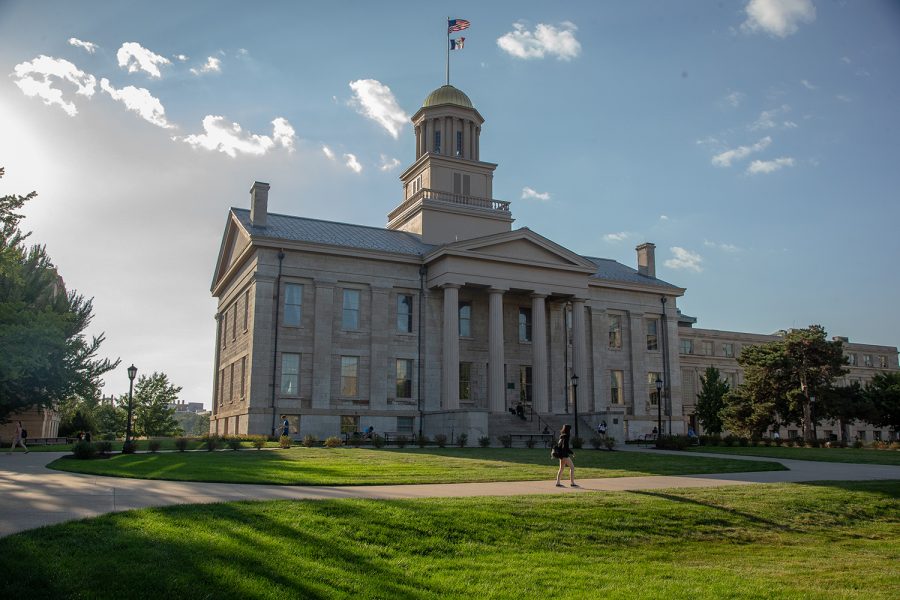UI graduate students campaign to get their union, COGS, recertified
COGS, the bargaining unit for graduate students, is having a vote to be recertified. The problem is getting the word out.
The Old Capitol building is seen in 2018.
October 14, 2018
Several University of Iowa bargaining units face elections in the next two weeks to be recertified as the bargaining units for their respective employees — the first such elections these units have faced since a 2017 law changed the collective-bargaining rights of Iowa’s public employees.
The vote will be held today through Oct. 29. In order to be recertified, units need a 50 percent plus one vote; every eligible employee who does not vote is considered a no vote.
The Campaign to Organize Graduate Students, the bargaining unit for graduate students, is one of the units up for recertification. Other such units include four American Federation of State, County, and Municipal Employees units: Blue Collar, Clerical, Security, and Technical.
The elections started when Iowa’s collective-bargaining law changed in 2017 under then-Gov. Terry Branstad, making it mandatory for all public-sector unions to recertify when their contracts expire.
The Iowa Public Employment Relations Board, which oversees the recertification elections, promotes cooperation between the government and its employees, said Amber DeSmet, an administrative law judge for the board. The board enforces Chapter 20 of Iowa Code, which covers unions’ collective-bargaining rights.
She said 468 units were up for recertification last year, and of those, 31 were not recertified.
COGS President Laura Szech said the union, which started in 1996, has represented students’ concerns such as tuition and university pay. All graduate students with assistantships are eligible to vote in this election, she said — anyone who is a teaching assistant or a research assistant, for example.
The elections are not funded by the government, she said, so COGS pays for it out of the organization’s dues money. That cost the organization almost $2,000, she said.
“It is really frustrating because we didn’t ask for this election,” Szech said. “No graduate students asked for us to be recertified.”
The 2017 law change has been detrimental to COGS’ membership, she said.
“We no longer collect dues through payroll [the way] unions usually do,” she said. “On July 1 [2017], the law changed so we could no longer [collect dues through payroll], which meant we had to come up with our own system of collecting and managing dues …”
Szech said this was challenging because COGS is a volunteer-run organization.
“Students don’t realize that they are no longer dues-paying members, because it was always automatically deducted from their payroll,” she said. “We had to talk to every single member to get them to rejoin. It took a lot of time to do that.”
Paying dues is not mandatory for members, Szech said. Although all graduate students who work on campus are members of COGS, only students who volunteer pay dues. These students then become voting members.
RELATED: COGS calls proposed tax bill a ‘danger to higher education’
“When we go through contracts, for example, the members get to vote on those proposals,” she said. “They basically get to have a stronger voice.”
In this election, COGS’ contract is at stake. Szech said this contract between COGS and the UI allows guarantees graduate students certain protections from the university.
COGS is worried about students not voting at all in this election, Szech said.
“But the way it is set up, if you don’t vote, it is the same as voting no,” she said. “It’s not a democratic election. Our hardest problem is getting what’s at stake. Most people don’t understand that they are in our unit and they are expected to vote …”
The UI has communicated to eligible members via email and by posting notices on bulletin boards, informing them about the vote as directed by Iowa Public Employment Relations Board, UI spokesperson Jeneane Beck said in an email to The Daily Iowan.
“Communication with eligible voters in the COGS bargaining unit, as well as other eligible voters in different bargaining units, has been done as explicitly directed by [the board],” she said. “For the employer to communicate any additional information could be viewed as interference with the recertification election.”






